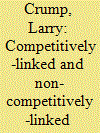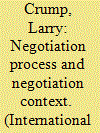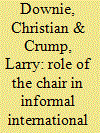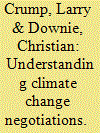| Srl | Item |
| 1 |
ID:
076023


|
|
|
| 2 |
ID:
105184


|
|
|
|
|
| Publication |
2011.
|
| Summary/Abstract |
This article examines how external events grounded in a negotiation's relevant environment (i.e., negotiation context) influence negotiation process and outcome. Multilateral, regional and bilateral environments are examined through linkage theory to gain understanding about the impact of external events or context on negotiation process and outcome. Linkages between a negotiation and its context are examined through five trade negotiations: the WTO Doha round (multilateral-global); the Free Trade Area of the Americas (multilateral-regional); EU-Mercosur (bilateral-regional); EU-Chile (bilateral); and US-Chile (bilateral). In addition to developing greater understanding about the strategic relationship between a negotiation and its context this article establishes a theoretic framework that defines the known universe of linkage dynamics. The impact of multilateral environments on the regional negotiation process and outcome is of particular interest, as is the strategic use of bilateral environments in seeking to achieve multilateral geopolitical ends.
|
|
|
|
|
|
|
|
|
|
|
|
|
|
|
|
| 3 |
ID:
180895


|
|
|
|
|
| Summary/Abstract |
This study considers the challenge of operating a regional association that includes combatants and adversaries as members, and the response to such challenges. Conflict type, defined by intensity and duration, is located on the vertical axis, and engagement level (international, regional and bilateral) is fixed along the horizontal axis, to distinguish the conditions supporting confidence-building (one of many peacebuilding approaches). The utility of this framework is examined by applying it to the Union for the Mediterranean – a 42-member association operating in a region where conflict is prevalent (Syrian war, Arab – Israeli conflict, Greece – Turkey conflict, and Algeria – Morocco conflict). The study concludes that confidence-building has relevance to hot and cold intractable conflict but not to contemporary war. Curiously, the intractable conflict literature rarely discusses confidence-building and the Euromed literature does not characterize EU behavior in a confidence-building context. The study builds a research agenda to further examine the confidence-building framework.
|
|
|
|
|
|
|
|
|
|
|
|
|
|
|
|
| 4 |
ID:
155441


|
|
|
|
|
| Summary/Abstract |
Scholars of international relations have devoted significant effort to understanding international organisations. However, two areas have been understudied: the role of the chair in international multilateral negotiations and the role of informal international organisations. Yet informal international organisations are increasingly important in international affairs as world leaders turn to smaller and more flexible forums to address global challenges. This article addresses these two blind spots in the literature by considering the role of Australia as chair in one of the most important yet most understudied informal international organisations: the Group of Twenty (G20). Drawing on primary interview data and the participant observations of the first author, who was a member of the G20 chair in 2013–14 during Australia’s presidency, the authors examine two theoretical puzzles: (1) why states delegate control of the negotiation process to a chair and (2) how the chair can, and does, influence the negotiation process. It is argued that member states delegate control to the chair to overcome specific institutional failures and, in doing so, provide the chair with the power to influence the negotiation process. The authors also argue that the G20 case indicates that existing theory overlooks key factors which restrict the capacity of the chair to influence the negotiation outcome.
|
|
|
|
|
|
|
|
|
|
|
|
|
|
|
|
| 5 |
ID:
113955


|
|
|
|
|
| Publication |
2012.
|
| Summary/Abstract |
Application of a turning points analysis to detailed chronologies of events that transpired prior to and during two matched cases of multilateral intellectual property rights (TRIPS) negotiations yields useful lessons for understanding negotiation process and effective negotiator behavior. The unfolding negotiation process is traced in the GATT Uruguay Round and prior to and during the WTO Doha Ministerial. Departures from earlier trends in the chronologies merit special attention. A departure is defined as a clear and self-evident change from earlier events or patterns in the form of an impactful decision taken by one or more parties. By coding the causes (precipitants) and effects (consequences) of the departures, we perform a turning points analysis. The turning points analysis, composed of three-part sequences, reveals the triggers and impacts of departures during the extended TRIPS negotiation process. The analyses will allow a comparison of the patterns that unfolded during the two phases of TRIPS negotiations, which will highlight the breakthroughs that occurred during the Uruguay Round and the crises that emerged later, prior to and during the Doha Ministerial. Improving the effectiveness of multilateral trade negotiations depends in part on understanding how critical turning points emerge.
|
|
|
|
|
|
|
|
|
|
|
|
|
|
|
|
| 6 |
ID:
137649


|
|
|
|
|
| Summary/Abstract |
Climate change is the largest and most complicated interdependent issue the world has confronted. Yet there is little negotiation and conflict management knowledge within the climate change context. To address this gap, this theoretical article reviews the sparse extant literature and provides a brief overview of the science of climate change public policy. This review establishes a foundation for examining negotiation and conflict management research questions that emanate from current and future climate change negotiations. Such questions are considered for climate change mitigation negotiations and climate change adaptation negotiations. This article demonstrates how the negotiation and conflict management field can make important contributions to the study of interdependency in a context of climate change.
|
|
|
|
|
|
|
|
|
|
|
|
|
|
|
|